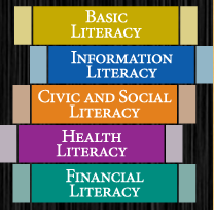By Caitlyn Boland, Assistant Director
Butler Area Public Library
Mark your calendars on April 23-30, 2016 for Money Smart Week. This national initiative is in its sixth year between the ALA and the Federal Reserve Bank to provide financial literacy programming to help members of your community better manage their personal finances. Libraries of all types can and do participate, providing programming for all ages and all stages of life on topics such as: basic budgeting; managing student debt; retirement planning; home purchasing; saving money through couponing; and how to prevent identity theft.
While it’s easy to recognize the need for financial literacy classes for adults, it is important to consider that money smarts can be introduced at an early age. For children, libraries can host piggy bank storytimes and set up a pretend store in the library to teach the value of a dollar in a fun setting.
Teenagers can often benefit the most from financial literacy programs and Money Smart Week. Just last week, in a conversation with several colleagues, we discussed that our financial education as teenagers was severely lacking. We were in AP classes, studying hard to get good calculus grades in hopes of some kind of scholarship for pricey private universities. In all of the classes we took in high school, not one of them educated us about the student debt we would face following college. Our guidance counselors hadn’t provided any guidance and our parents had no real insight because a college education for them was significantly less expensive than it is now.
Libraries can fill this financial literacy void by offering teens educational programs on topics such as career outlooks, the cost of colleges and technical schools, scholarships, what student debt really means and practical ways to avoid debt even without scholarships, and careers that don’t require a traditional four-year education. We can also offer programs on car buying for teens with a breakdown of all the costs that go along with it, credits cards and credit scores, investing and creating budgets to match their future career incomes. Take a look at https://www.saveandinvest.org/educate-youth/lesson-plans-and-assessments and http://www.moneysmartweekpartners.org/ala_teens_and_money. These websites offer some fantastic resources for librarians looking to offer more financial literacy programs to their teens.
 Visit the Money Smart Week home page of the Federal Reserve Bank (Chicago) or http://www.ala.org/offices/money-smart-week#BMS for additional details about Money Smart Week.
Visit the Money Smart Week home page of the Federal Reserve Bank (Chicago) or http://www.ala.org/offices/money-smart-week#BMS for additional details about Money Smart Week.

